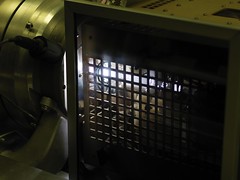MQ Series: XIMEA Creates World’s Smallest USB 3.0 Industrial Camera
MUNSTER, GERMANY (PRWEB) December 01, 2011
XIMEA GmbH is pleased to introduce the MQ series industrial camera, the world’s smallest and fastest USB 3.0 camera for industrial imaging and machine vision.
XIMEA’s MQ series USB 3.0 SuperSpeed data interface delivers up to 5 Gbps of data, enabling image transfers of up to 400 megapixels per second (Mpix/s). Despite its small size – measuring just 26.4 x 26.4 x 19.1 mm and weighing a mere 26 g – the MQ series includes all the standard I/O and features demanded by industrial imaging customers. MQ series cameras include a growing variety of high-grade CMOS sensors with resolutions ranging from VGA to 4 Mpix, global shutters, frame rates up to 600 fps, and improved quantum efficiency (QE) in the visible and NIR spectral ranges. A high dynamic range (HDR) model offers maximum sensitivity with a dynamic range of up to 100 dB.
Connecting the MQ series cameras to industrial data processing systems, OEM equipment, and PCs is greatly simplified with the inclusion of opto-isolated trigger input and illuminator control output, as well as on-board non-volatile memory for user settings and custom data. XIMEA’s MQ series cameras only consume between 1W to 1.8W, easing the power and thermal management design challenges for OEMs and end users alike. And like all XIMEA’s industrial cameras, each MQ series ships with application programming interfaces (APIs) for the most common image processing software, including programs from Cognex, Matrox, National Instruments, MVTec, and many more. Prices for the MQ series start at EUR189 for the 1.3 Mpix version.
“We’re very proud of our development time,” says Max Larin, CEO and head of product development and engineering at XIMEA. “Empowered with modern design methodologies and tools, XIMEA’s designers developed the MQ family in only 100 days while still achieving record data throughput performance in an unbelievably compact housing. It also helps that XIMEA is an active member of USB3 Vision Standard Committee, which ensures that all future MQ series cameras will comply with the emerging USB 3.0 standard.”
About XIMEA
XIMEA GmbH believes that the best industrial, smart, and scientific cameras offer the highest levels of processing power, compatibility, and support at a competitive price. That’s why for more than 20 years, XIMEA has designed the smartest, most compact industrial cameras for machine vision applications in motion control, assembly, robotics, and industrial inspection and process control, as well as scientific cameras for life-science, security, and defense applications. Learn more about XIMEA at http://www.ximea.com.
###
Attachments
![]() ©Copyright 1997-
©Copyright 1997-
, Vocus PRW Holdings, LLC.
Vocus, PRWeb, and Publicity Wire are trademarks or registered trademarks of Vocus, Inc. or Vocus PRW Holdings, LLC.


